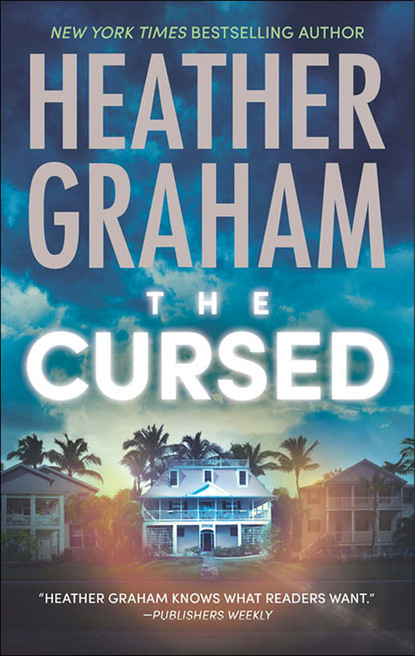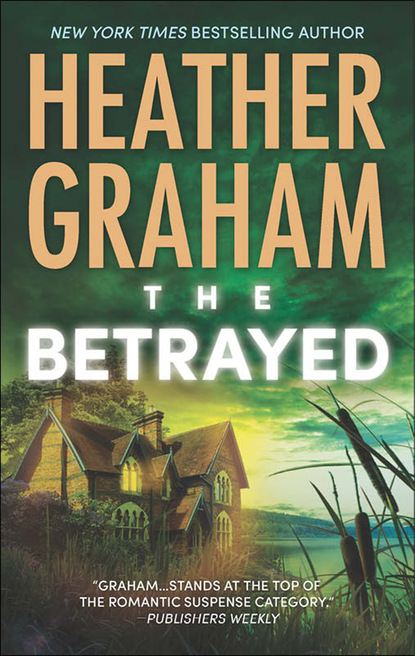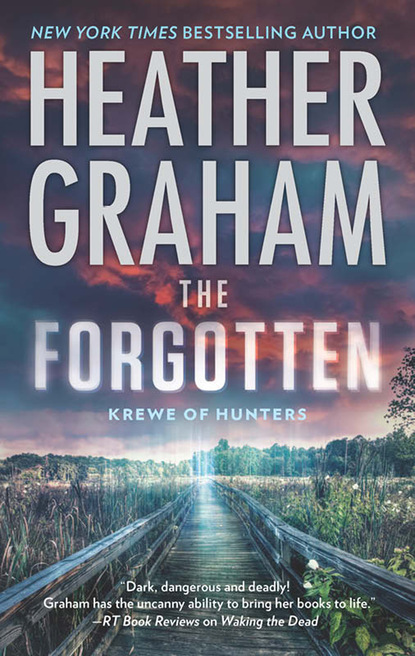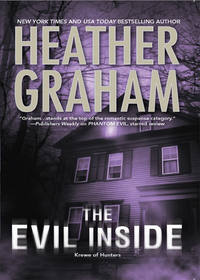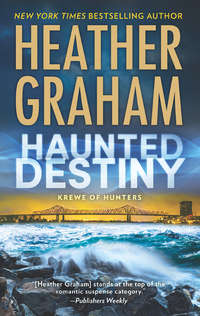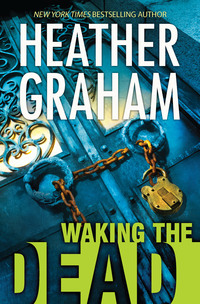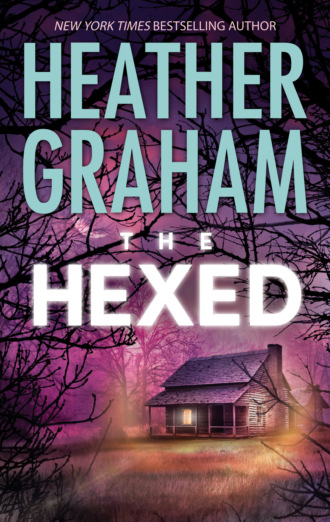
Полная версия
The Hexed
Devin felt her muscles tightening at the reminder of the way some locals had mocked her aunt and the cottage.
“I don’t know what you’re talking about,” she said coldly.
“Sorry, just growing up so close—in Peabody—there were rumors about this place, that’s all. It was owned by an older lady, by all accounts a lovely woman, who was a Wiccan and grew herbs and...every girl I went to high school with wanted a love potion from her. I guess she passed away—she was quite elderly even then. Did you know her?”
“Yes. She was my great-aunt, Mina Lyle,” Devin said. She couldn’t help the chill in her tone.
“I’m sorry. I didn’t mean to offend you. About those questions...?”
She shrugged. “Come in. The house doesn’t bite.”
“I didn’t think it did.”
She led the way in and offered him coffee, then went to get it, leaving him in the parlor, studying all her treasures.
When she returned, Poe was sitting on his shoulder.
She looked at the bird. Wretched traitor! she told him silently.
And yet...
She didn’t know what it was. She’d been so terrified after her discovery in the woods that she’d thought he was an idiot when he hadn’t immediately dialed 9-1-1.
Now...
Now she couldn’t help but note that he was extremely good-looking in a masculine but rather...federal way. He could have walked onto the set of a new Men in Black movie and fit right in.
“He’s great,” Rockwell said of the bird. “What’s his name?”
“Poe.”
“Of course. Well, let’s set you on your perch, Poe,” he said, and easily urged the bird back onto the white pine perch in his large cage. He looked over at Devin. “And thank you. For seeing me, speaking with me—and for the coffee.”
As he sipped, his eyes wandered, then lit on the marble bust of Madame Tussaud.
He walked over to it, and she realized that he was staring at the pentagram medallion.
He turned to her. He was tense. Hard. Everything about him had changed.
“Where did you get this?” he demanded.
And she realized that the icy stare that he was aiming her way was filled with...
Suspicion.
3
None of the pentagrams were the same. No one of the three was like either of the other two. Rocky had seen all three medallions, and they were firmly etched in his memory.
The first, the one he’d seen on Melissa Wilson’s body, had been a very clean design, with only a thin line of silver vines winding around the angles at each point of the star.
On the second—found on Carly Henderson—the points of the star were themselves formed by green-tinted vines.
The third—found on Jane Doe last night—had intricate little flowers at each point.
And now this...
It was probably one of the nicest pieces of jewelry he had ever seen. Enamel delicately decorated the silver to create slender elegant leaves around the points of the star, and there was a tiny stone at each point—a sapphire. There was something so fragile and beautiful about the piece that it was instantly arresting. In a city where there were probably thousands of similar pieces for sale, this one was exquisite.
And enough like the others that they all just might have been created by the same artist.
He stared at Devin Lyle, and she stared back at him. Maybe she thought he’d lost it. She hadn’t trusted him much from the get-go, he thought, even though she had flagged him down.
“Who are you—really?” she asked him.
“Agent Rockford. Really.” By rote, he produced his badge.
She looked at it, then at him, and said, “You do realize that badge doesn’t mean much these days. We—the innocent public—are conditioned to accept any kind of forgery because we’re accustomed to seeing official badges everywhere.”
“It’s real,” he told her, smiling.
“So I really flagged down an FBI agent—by accident—after stumbling across a body?”
He nodded, but he wasn’t about to get distracted from what really interested him. “Where did you get this piece?” he asked her again.
“My friend’s shop. She has a number of them. I’m not much for diamonds, but I do love colored stones.”
“Like rubies, emeralds and sapphires?” he queried. It wasn’t an attack, though he could tell from the way she looked at him that she had taken it as one. She seemed to believe that he suspected her—or her friends—to be guilty of something.
“Citrine, aquamarine, opals—fire opals are my favorite,” she said. She set his coffee on the natural-wood coffee table that stood between what Rocky was pretty sure was a grouping of eighteenth-century carved chairs and a love seat.
“Your questions can’t be about my likes and dislikes when it comes to jewelry,” she said, sitting down. “I don’t know what else I can tell you. I heard a noise outside. I grabbed my hockey stick and went out into the woods, and there she was. My first instinct was to get help—to get the police. I was closer to the road than I was to my house. Okay, I was panicked and afraid the killer might be around and follow me home, so maybe that’s why I ran to the road. I saw her, but I didn’t know her,” she added quietly.
He took a seat across from her.
“What did you hear?” he asked her. “The M.E. reckoned that the time of death was around five o’clock. You found her hours later. That’s why I’m asking.”
She shook her head. She was evading him, he thought. “I don’t know exactly. I just thought that someone might be hurt or something, so I went out.”
He could press it, but he could tell she wasn’t going to say more. So far he’d called her beloved deceased great-aunt a crazy witch and jumped down her throat over a medallion. Not good. He wanted her help.
She turned the tables. “So you’re from here?” she asked him. “You said something about Peabody.”
“Born there. My mother could trace her family back to the Mayflower. She’s proud of it. I have more of a tendency to think the ship was filled with hypocrites. They wanted freedom, so they came here and persecuted others, and, as we both know, their descendants tangled themselves up with the witchcraft trials. My father was from Texas, but he loved my mom, so I was born here. What about you?”
“I grew up in an old Victorian right here in Salem. I could see the House of the Seven Gables whenever I went outside.”
“And you never left?” he asked.
“No, I left. I was a reporter in Boston for a while, then I came back. But I’m sure you didn’t come here to chitchat about growing up in New England.”
She had blue eyes—deep, direct blue eyes. The color of the sapphires on her pentagram. He lowered his head for a minute, hiding a dry smile. She was the perfect image of a witch, or of the Hollywood version, at least. Her hair was as dark as the wings of her pet raven. She was tall and slender, with elegant curves and perfect posture. She was in jeans today, and a soft sweater that hugged her form nicely, but—given a cloak and a scepter—she could have stood on a hill in the wind and, with an evil chant, lifted her face to the heavens and demanded that the lightning strike and the thunder roar.
And there was something she wasn’t telling him.
“I wish there was more I could tell you. I so wish I could have done something to help that poor woman. If I knew anything that might help assist you, I would be writing it down to make sure you had it right,” she told him.
“Thank you. I do need the name of your friend—the one you bought that medallion from—and her store.”
She nodded. “You know, there was another woman killed in Swampscott two weeks ago,” she said.
“Yes.”
“The police aren’t giving out much information. And they aren’t saying much about the woman I found, either,” she said. “It was the same killer, wasn’t it?”
“They aren’t giving out information because they’re trying to weed out all the crackpots who want to confess to murders they didn’t commit. They’re also trying to avoid—” He stopped abruptly.
“To avoid?”
“Copycats.”
“The officer last night asked me not to give out any information about the body,” she said.
“And that’s important. Luckily, we managed to have the scene sealed off and most of the work done before the press showed up last night. They don’t know that you’re involved, so hopefully there won’t be anyone trying to get information out of you.”
“I can keep quiet,” she assured him. She hesitated. “But...this is also like that other murder...the one that happened thirteen years ago.” She looked at him with that direct blue stare of hers. “In Peabody,” she said.
“Yes,” he said quietly.
“You...were there?”
“I was a senior in high school at the time.”
She rose and walked over to the mantel. “Were the other women found with medallions like mine lying on their breasts, as well?”
He hesitated, then realized that having seen one victim, she was smart enough to draw conclusions.
“Yes. But that’s something else I hope you’ll keep to yourself.”
She turned and looked at him. “Are you thinking they’re some kind of Wiccan sacrifice? I ask because I know that might be a lot of people’s first impression. But you’d be really wrong. Half my friends are Wiccans. They’re...like flower children. They believe in good things. People have a tendency to think that Wiccans follow Aleister Crowley’s tenets, but you grew up around here, so you must know that’s not true. Crowley was a hedonist who used whatever suited him to create his own brand of religion. He even homed in on Masonic principles, and the Masons I know are great people. My dad is a Mason, and he and his friends bowled a lot and raised money for children’s charities. Trust me, no real Wiccan committed these murders.”
She was passionate and clearly convinced of the truth of what she was saying. And of course, he hadn’t grown up in the area for nothing.
“Do no harm to others lest it be returned to you threefold,” he said.
She seemed a little startled. “Yes.”
“No true Wiccan did anything like this, no,” he said. “But there are still other people out there who could have, and could have made it look like Wiccans were involved. Satanists, or plain old nutcases. We don’t know yet. But hunting down the source of the medallions will be important, and with three of them, we finally have a shot.”
“Well, I can assure you that my friend Beth Fullway, who owns the shop where I bought my medallion, isn’t involved. She and I were thirteen when the first murder occurred. We went to school together.”
“But did she create the piece?” he asked.
“No,” Devin admitted.
“What’s the name of her shop?”
“The Haunted Dragon. It’s right on Essex.”
He picked up his cup and finished his coffee. It was excellent. Black and strong, with no bite or aftertaste. He set the cup down regretfully.
“Thank you.”
“Of course, Agent Rockwell.”
“Rocky,” he said.
“Pardon?”
“Please, just call me Rocky.”
“Your name is Rocky Rockwell?”
“Craig Rockwell. But I’ve always gone by Rocky.” He turned toward the door, then stopped and extracted a card from his wallet. “Please, call me if you think of anything.”
She accepted the card and slid it into the pocket of her jeans. “I will.”
“And keep your doors locked.”
“Of course,” she said again, stepping forward and opening the door for him.
He had started toward his car when she called him back.
“Agent Rockwell. Um, Rocky?”
“Yes?”
“Maybe I could come with you. I’ve known Beth all my life. I’m afraid if you just go in and start questioning her...”
“You think I come on too tough?” he asked her.
“Well, when you first asked me about the necklace—the medallion—I thought you were going to arrest me.”
He was thoughtful for a moment, not sure how much he wanted to involve this woman.
“I really can help,” she said. “You’ll find out more if you let me introduce you and play it cool.”
Maybe she could help him. Like Jack Grail, she was a lot more closely tied to the area than he was.
He let out a breath.
“Sure. Let’s go.”
“Wait, give me a second,” she told him.
She ran into another room and came out with a large box. He reached to take it from her.
“It’s okay,” she said. “I have it.”
“Please.”
She let him carry it. “Crown jewels?” he asked her.
“Books.”
He looked at her questioningly.
“I’m a writer.”
“Oh.”
She didn’t elaborate.
“Of what?”
“You mean you don’t just assume that because I live in Salem, I must write about ghosts or monsters?”
“You could write anything. Fiction? Nonfiction?”
She blushed. “Witches—for children.”
He grinned knowingly, and her blush deepened.
“They’re based on my great-aunt.”
“The good witch.”
“The Wiccan. As you know.”
Once they were in his car, she turned to him curiously. “Don’t you think it’s awfully coincidental that you came back to town just in time to be on the road when I ran out?”
“Not really. I’m here because of the murder in Swampscott.”
“Ah,” she said, looking at him. She was waiting for more.
“And because of the murder thirteen years ago. Because of the similarities.”
“You must be pretty high up—to be able to pick your assignments, I mean.”
“I got lucky,” he said simply. He should have added that he wasn’t sure he was even official yet, he just happened to be friends with the lead detective on the case.
They headed to the pedestrian mall on Essex and he parked in the public garage. As they walked out to the street Rocky looked at the old Civil War building that was now the National Park Visitors’ Center. When he’d been growing up, it had been under reconstruction. As they reached Essex Street he reflected that while specifics changed, the town didn’t. Shops had different owners and offered different delights, but the overall effect was still the same. He paused, allowing himself a small moment of pride. Yes, the town was commercialized. But even so, most places—even the shoddy museums with less than stellar mannequins—made a point of getting the history right. They offered theories on what had caused the mass hysteria that led to the witch trials, but they didn’t profess to have the definitive answer. They reported history.
He listened to the chatter on the street. Some of the tourists were talking about the news—about the fact that a second woman had been murdered in just two weeks.
“Young women,” one man said. “Out alone.” He looked at the teenage daughter walking next to him. “You won’t be going anywhere alone.”
“Dad!” she protested.
“How dreadful,” a woman passing by said to her friends.
“Yes, but we’ll all stay together and be safe,” offered one of them.
Devin undoubtedly heard them, too, but she just watched him instead.
“Beth’s shop is this way,” she finally told him, taking the box from his arms and starting to walk away.
He followed her. When they entered the shop, a little bell rang and a pretty petite woman behind the counter looked up.
“Devin! You have my books. Thank you,” she said. “I had a mom in here a while ago asking about the new Auntie Pim. I have her number. Now I’ll be able to call her back and— Oh, hello.” She was clearly surprised to notice that Devin wasn’t alone.
“Devin! Who is this?” she asked.
“Rocky. Um, Rocky Rockwell,” Devin said.
She’d probably already forgotten the “Craig” part, he thought.
Rocky took Beth’s hand in a firm grip and said it was a pleasure to meet her.
“A friend from Boston?” Beth asked.
Before Devin could answer, Rocky seized on the opportunity.
“Yes. And Devin has told me that you have the best shop in town.”
Beth flushed, while Devin stood silent.
“Thank you, and welcome to Salem,” Beth said. “I hope you enjoy our city.”
“Thank you. Your store looks to be as wonderful as Devin said.”
“Thank you again. And where are you from, Rocky?” Beth asked him.
He grinned—charmingly, he hoped. “Peabody.”
Beth laughed. “Of course you are. No one who isn’t ever says it right.”
While the rest of the world pronounced all the syllables, locals said it more like Peab’dy.
“Small world,” Beth went on, delighted. “I wonder if we ever met at a concert or something, somewhere along the line.”
“He’s older than we are,” Devin said. “And he’s been gone a long time. He and I never knew each other locally, either. Until now.” She blushed. “I mean, he’s here now.”
“Oh,” Beth said. “Ohh.”
Clearly she had heard an implication of intimacy that Devin had never intended. Rocky was amused. Devin wasn’t. But Beth quickly went on to other matters.
“Devin, you have to be careful. Have you seen the news? Another young woman has been killed. They haven’t identified her yet, but...it sounded as if she was found not far from your house.”
“Yes, I know,” Devin said.
“Want to come and stay with me?” Beth asked her. “I mean, I live right here in the middle of the city. A lot safer, don’t you think?”
“I’m okay right now. But thank you for the invitation.”
“I guess you need to be home in the cottage to write. I mean, Auntie Pim is Mina. Did you ever meet her, Rocky?”
“No, I’m sorry to say that I didn’t,” Rocky said.
“That’s too bad. She was a remarkable woman.” She turned back to her friend. “Devin, please be careful,” Beth urged.
“I will be. I promise.”
“Buy some pepper spray or something.”
“I’ll think about it.”
They were interrupted as two women, one noticeably tall and the other much shorter, walked toward them from the back of the store. The tall woman appeared to be about fifty. She had shoulder-length snow-white hair that curved around an attractive face and wore a black dress that fell to the ground. The other woman was clutching a number of shopping bags. She thanked her companion, waved cheerfully to them at the counter and left the shop.
“Hello,” the white-haired woman said as she walked over to Devin and gave her a quick kiss on the cheek. “Delighted to see you. Did you bring books?”
“Yes, I brought the box,” Devin said.
She didn’t get a chance to introduce Rocky, because Beth stepped in.
“Gayle Alden, this is Rocky Rockwell, a friend of Devin’s. Rocky, Gayle is one of the two best mediums in the city. The other, of course, is my other employee, Theo Hastings, but Theo is off today.”
“How do you do?” Gayle said politely, then turned to Beth with a twinkle in her eye. “I don’t suppose he’s here for a reading, is he?”
“Actually, I’m here about a piece of jewelry Devin bought from you,” Rocky said.
“The silver pentagram. Or pentacle—whatever you choose to call it,” Beth said. “Technically, it’s a pentagram when it’s just the symbol and a pentacle when the star has the circle around it, but people mostly just say pentagram these days.”
Rocky smiled. “Whatever you call it, it’s a beautiful piece.”
“I’m sold out for the moment. They go as quickly as Devin’s Auntie Pim books,” Beth said. “But they’re done by a local artist. Sheena Marston. I can order one for you. In fact, if I special order it, you can have input on the design, if you want. She only works with silver, but she can add enamel, and precious or semiprecious stones. I had one with black onyx that was spectacular.”
“Is it possible to meet with Ms. Marston?” he asked. “It would be easier for me to explain my ideas in person.”
There was a slight pause. Gayle and Beth exchanged a long look filled with something he couldn’t decipher.
“She doesn’t actually see people,” Beth said.
“She’s something of a hermit,” Gayle added.
Gayle Alden was Sheena Marston, Rocky thought.
“Are the pieces exclusive through you?” he asked Beth.
“They are now. In previous years, a number of shops carried her work, but I convinced her that being exclusive would be to her advantage,” Beth said.
“I’m sure Beth and the Haunted Dragon will have more soon,” Gayle said.
“Are you a Wiccan, Rocky?” Beth asked.
“No, but I think the pieces are beautiful,” he said.
“I’m so glad you like them,” Gayle said. “I’m guessing you’re thinking of getting one as a gift for someone. So many people think that only Wiccans should wear them. And a lot of others think they’re associated with devil worship, or that they’re just plain evil. In fact, there’s nothing evil about them.” She pointed to a pentagram-shaped paperweight on the counter. “From the top and moving clockwise, the points represent spirit, water, fire, earth and air.”
She met his eyes and continued. “There’s nothing evil about the pentagram or the modern practice of Wicca, which was established by a man named Gerald Gardner in 1954, with practices based on ancient pagan traditions. Laurie Cabot, arguably the most famous Wiccan high priestess, came to Salem in the 1970s and popularized Wicca here. And just as Christianity has many sects, so does Wicca. Some are traditional, others revere figures a lot like Christian saints. But none of them are evil.”
“Are you a Wiccan?” Rocky asked her.
She flushed. “No. Congregational church. But people here in Salem respect everyone’s beliefs. Or those of us you’d want to know do, anyway.”
He smiled. “Gotcha.”
The little bell rang as a group of tourists came into the shop. Gayle excused herself, and then Beth went to help a couple who were interested in the jewelry under the counter.
“Did that help you any?” Devin asked Rocky as they left.
He didn’t get a chance to answer her, because she’d been looking at him as she spoke, and now she plowed straight into another man.
“Devin! Hey, sorry.”
“No, I’m sorry,” she said quickly, backing away.
The man was almost Rocky’s height; he had slightly silvered hair, which somehow added to an impression of being debonair—or a lecher, one or the other.
“Completely my fault,” the man said. He looked at Rocky with raised brows.
Was that jealousy? Rocky wondered.
“Theo, meet Rocky Rockwell. Rocky, Theo Hastings. Theo works for Beth, too.”
They shook hands.
“Old friends?” Theo asked lightly.
“From Boston,” Rocky said, avoiding a direct answer.
“Oh, well, pleased to meet you,” Theo said. “Devin, always wonderful to see you.”
He smiled and moved on.
“Interesting character,” Rocky said.
“I think pretty much everything about him—including his claim to be Wiccan—might be an act,” Devin said. “His way of making it here. Anyway, I should get back.”
“Of course.”
“If you’re looking for a restaurant later, I can suggest a new one for you. It’s at the old jail. The place is apartments now, with the restaurant on the ground floor.”
“Thanks.”
They headed to the car, and he drove the short distance to her house. He got out and went around to open her door, but she’d already opened it by the time he got there.
“You’ve got my card, right?” he asked her.
“Yes, of course. And I’ll call you if I think of anything that might help,” she promised.
Still, he hesitated. “How well do you know Gayle Alden?” he asked her.
She arched her brows. “I’ve known her forever. She was one of my teachers in high school. She retired last year and went to work for Beth.”
“What did she teach?”
“History.” Devin was silent, a smile playing across her lips. “You don’t think that Gayle could possibly—”
“I think that Gayle Alden is Sheena Marston.”
That genuinely surprised Devin, who shrugged after a minute. “I have to say, that’s possible. We did a lot of reenactments in class, and she made a lot of the jewelry and things for the costumes.”
He nodded. “What about the old guy?”
“The old guy?” she asked.
“The one you crashed into.”


